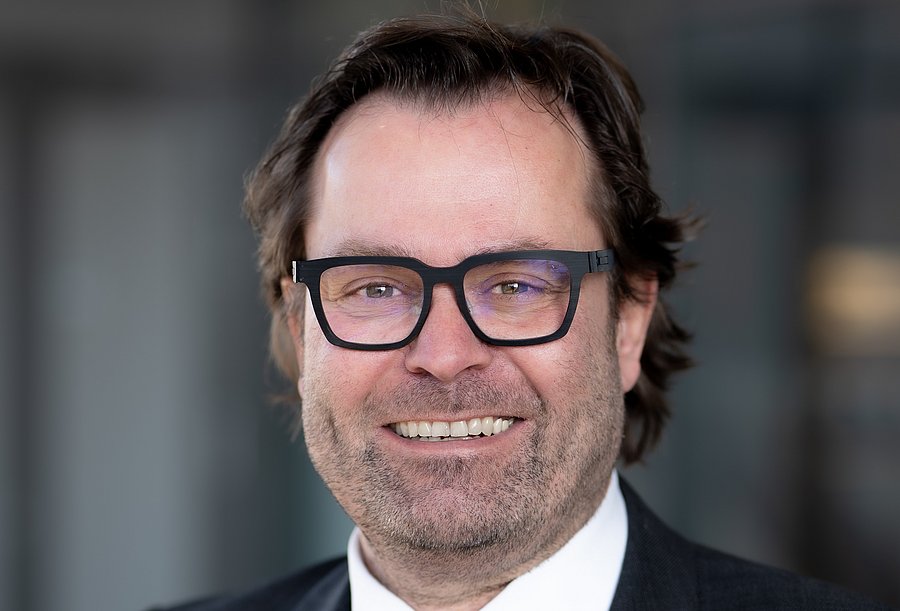
Corporate resilience
Prof Dr Michael Fallgatter / Economics
Photo: Markus Thomanek
Always consciously consider alternatives during ongoing operations
Economist Michael Fallgatter on ideas that make a successful company resilient
The resilience of German companies is inadequate! This is the conclusion of a report by software provider SAS. For Germany, the study says that "Only 40 per cent of respondents would attest to the resilience of their organisation, and one in two (51 per cent) believe that their company is not sufficiently prepared for disruptions."
On 25 September, the University of Wuppertal, the Bergische IHK and the Bergische Struktur- und Wirtschaftsförderungsgesellschaft, along with the city of Remscheid as well as Neue Effizienz, Solingen Business and the Wuppertal Technology Centre, are inviting you to the 7th Bergische Innovation and Education Congress (BIBK) in Remscheid, which is being held under the motto: Strengthening resilience in small and medium-sized enterprises. Approaches for the Bergisch Three.
Prof. Michael Fallgatter heads the Chair of Human Resources Management and Organisation at the Schumpeter School of Business and Economics at the University of Wuppertal. At the BIBK, he will be speaking 'On the power of the informal' and says that "When it comes to corporate resilience, the individual is the decisive factor!"
Corporate resilience, a term that needs to be understood
"Resilience is nothing new for companies," says Fallgatter, "if we take the prudent businessman, who is also the ideal image of the German Commercial Code, as our starting point, and then it is enshrined in law that you have to be careful. You have to build up reserves, only report profits once they have been realised and you have to report losses immediately." Preserving substance is a fundamental idea of business management thinking and action. However, crises such as Covid 19 or climate change are challenging us in a completely new way and the concept of resilience, which we often interpret psychologically, does not apply in the context of companies.
"In psychology, we learn to deal with our own resources. In a crisis with a superior or in the private sphere, a professional crisis, a transfer or a company location decision that is unfavourable for the employee, we usually fall back on our own networks. People remember positive experiences and reinterpret the situation. But that doesn't work for companies," says the scientist, because when a crisis arises, it means that the existing business model no longer works. "You can't just tell yourself that it's not that bad or that I'm still strong, but you have to try to act very quickly and realise sales again, for example." The inevitable measure that saves the company is then called change.
Exploitation and exploration - thinking about alternatives
However, what can change look like? Fallgatter explains: "You must or should make sure that you do not only pay attention to the existing business model, but also think about alternative possibilities. In economics, we also have a pair of terms that precisely describe this: Exploitation and exploration. This is a marvellous pair of terms and highlights precisely the problem that resilience is all about. Exploitation means exploitation and exploration means exploration." Exploitation typically dominates, because people usually orientate themselves on existing successes, gain experience in certain industries, with certain customers and certain solutions, consolidate this, optimise it further and further so that it becomes better and better, stronger and stronger, more and more efficient. At the same time, however, this prevents us from looking at the other side, at exploration. The more you focus on exploitation, the more likely you are to neglect exploration. Moreover, this exploration - the importance of thinking about possible alternatives, so to speak - needs to be emphasised. "We only talk about corporate resilience when a crisis hits. And it can only hit if you have no alternative beforehand. The title of my presentation at the BIBK, 'The power of the informal', shows that this cannot be really organised. You can set up a staff unit, but that is expensive and difficult to realise for medium-sized and small companies. But if you manage to get a workforce to share the conviction that change is something positive, if you can create the expectation that the individual employee will continue to work even if there is a change, that you won't get stuck, then that is the basis for being able to talk about resilience." Commitment, intrinsic motivation, job satisfaction and the self-binding nature of employees are crucial. "Without that, you can forget about resilience. The individual is the decisive factor. You have to utilise these resources, never at the expense of your employees, but by using their strengths. That is the great entrepreneurial achievement."

Ideas from employees in the company move the business forward
Photo: Pixabay
Substantive changes through the construct of "trust"
Substantial changes are necessary in order to cope with new situations. In addition to recognising this, however, company managers in small and medium-sized enterprises also need to be able to implement it. "You have to create bonds," says Fallgatter, "create job satisfaction so that the construct of trust is there. However, you have to establish that. It is always a lengthy process and it requires an entrepreneurial attitude, an attitude from managers that values individuals, promotes them internally and creates the possible structures."
New forms of expression for values
Thinking about alternatives cannot mean thinking about typical solutions in crises. Unfortunately, this still often happens. Although the performance of an employee can be measured objectively, the informal contributions and suggestions are forgotten because they cannot be measured. "But you can organise the informal aspects with employees. You need forms of expression for the values at stake. Fallgatter cites an international example in which the factor of chance can play a decisive but important role for companies. "The most expensive office building in the world is Apple Campus 2, a ring building. The ring is 1.6 kilometres long, has a maximum haptic quality and the experience of being there is fantastic. Inside there are centres with lecture halls and theatres, everything is glass and that makes for randomness. And for Apple to continue to function like a start-up, that's the idea, it needs chance encounters. A developer in one area might accidentally strike up a conversation at the coffee machine with someone from another section. Then, months later, the developer remembers that they know someone who has knowledge in a certain area. That's networking." It is about realising coincidences. Apple does this consistently. In local companies, going to the canteen is often predetermined because there is a clear seating plan. "You don't even go to where the management board is sitting. These are informal barriers and continue to exist. Of course, breaking down these barriers is also exhausting, but that is the point. You can write the word appreciation on the blackboard as often as you like, but it only gets through if you talk to each other. And that's where new forms of expression for the informal are needed to make it work. And that's what companies do well."
Communication between employees and employers
The best way to find these forms of expression is through mutual interaction. Transparent communication, career opportunities, good social interaction and a well-equipped workplace with a stimulating environment lead to greater identification with the company. Company managers who think about resilience know that they cannot think everything through. "There are always ideas from individuals about what else could be done," says Fallgatter in conclusion, "many innovations come about because employees make suggestions."
The 7th Bergisch Innovation and Education Congress (BIBK) will take place at the new Lindenhof, Honsberger Straße 38, in Remscheid. Companies in the Bergisch Land can register via https://www.eventbrite.de/e/bergischer-innovations-und-bildungskongress-tickets-927740646247?aff=ebdshpsearchautocomplete.
Uwe Blass
Prof. Dr. Michael Fallgatter holds the Chair of Human Resource Management and Organisation at the Schumpeter School of Business and Economics at the University of Wuppertal.
